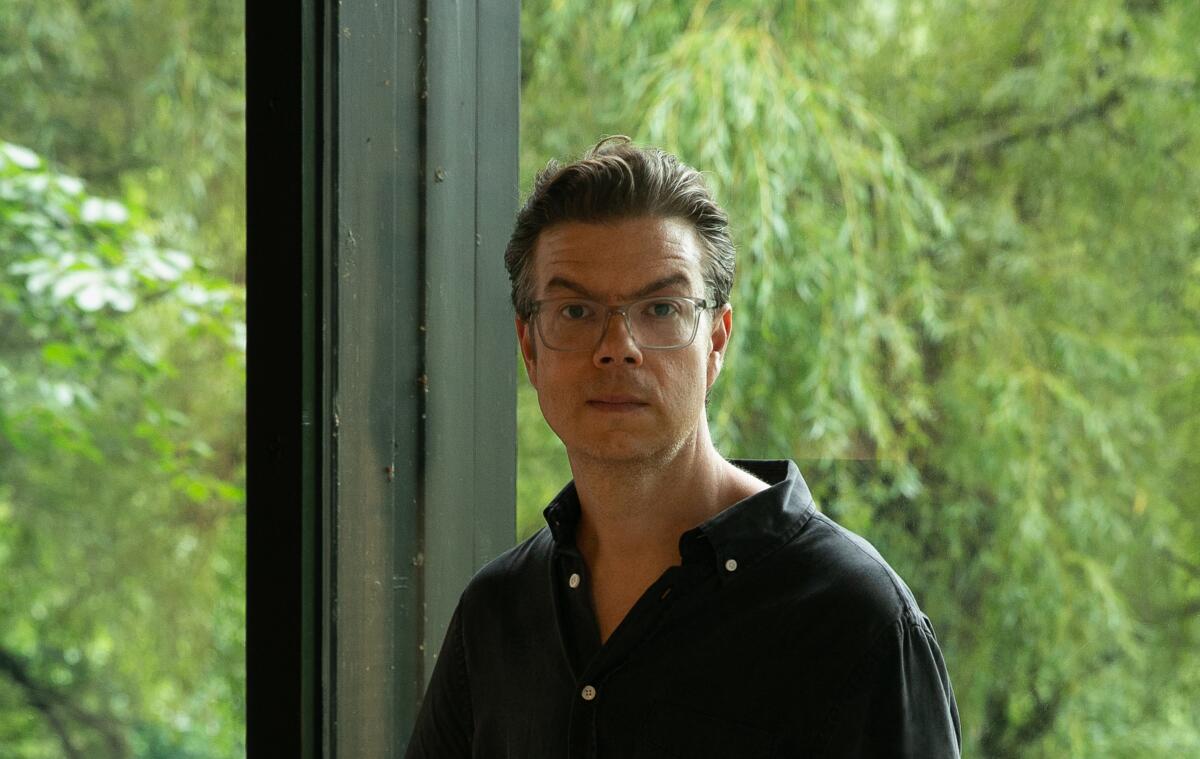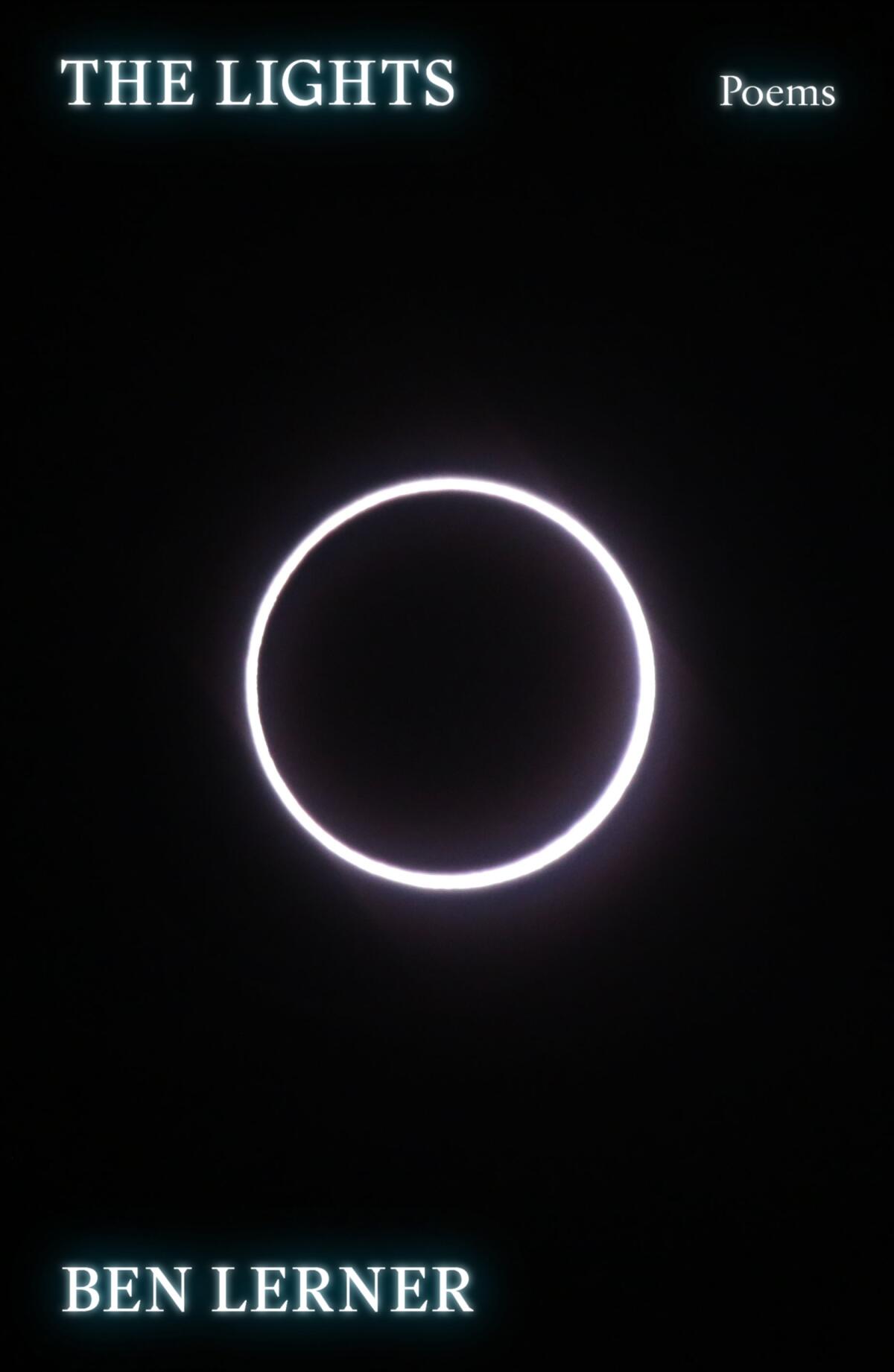How Ben Lerner’s writing shatters space, time and literary borders

- Share via
Review
The Lights: Poems
By Ben Lerner
FSG: 128 pages, $26
If you buy books linked on our site, The Times may earn a commission from Bookshop.org, whose fees support independent bookstores.
“You know how you sometimes realize it has been raining only when it stops,” Ben Lerner writes in “The Lights,” his fourth collection of poems, “silence falling on the roof, forming rivulets on the glass?” If this reads to you more like prose than verse, that’s part of the point.
The question is posed in a piece titled “The Media,” which was labeled “Fiction” when it was published in the New Yorker in April 2020. It is one of nine short prose texts in the book. A 10th, “The Rose” — inspired by Jay DeFeo’s abstract expressionist magnum opus — makes the slippage explicit, centering a prose section between two poetic movements, as if to suggest that form is an unstable container, that language is always in flux.
Lerner has long been elusive when it comes to genre; his novel “10:04” portrays an author trying to expand a short story into a novel; in a deft metafictional sleight-of-hand, he includes that narrative, previously issued under his own name. “Leaving the Atocha Station” and “The Topeka School” revolve around a character named Adam Gordon who shares key pieces of his creator’s history, although to imagine him as alter ego is not exactly right. Rather, Lerner is working a seam between what is recollected and what is imagined.
The 14 most essential L.A. poems or poetry collections, including those by Wanda Coleman, Robin Coste Lewis, Sesshu Foster, Bukowski, Brecht and more.
“[T]he goal is to be on both sides of the poem, / shuttling between the you and I,” he tells us in “The Dark Threw Patches Down Upon Me Also,” a densely referential effort invoking Walt Whitman and Robert Creeley as well as the west Texas town of Marfa, where Lerner spent time on a residency (an experience also woven into “10:04”). Here, we see the circularity, the back and forth of excavation and interrogation, that marks not only this new book but also Lerner’s entire body of work. “Here I am,” the poet acknowledges in “Untitled (Triptych),” “mitering two dreams: the dream of the poem, / then the dream of the poem of that dream.”

“Dream” arises not infrequently throughout “The Lights.” Also: time, eternity, forever, inner, outer, spoken, thought. I kept a list of such locutions as I was reading — an “index of themes,” to borrow the title of the opening poem. Lerner is a chewy writer, his language nearly synesthetic. You can taste it in your mouth.
He’s also a shape-shifter, moving gracefully between past and present, often within a line or two. “Tonight I’ll shave,” he writes, “have two drinks with a friend /of a friend, but that was last week and I canceled.” Even as these events appear contiguous, Lerner’s language reminds us they are not. The effect is of a delirious mutability, in which the poems coalesce almost in spite of themselves. “In the brief window between takeoff and the use of approved / electronic devices I believe great change is possible,” Lerner offers, and that is the space in which “The Lights” takes shape.
It is a rare skill, crafting prose that reads like stream of consciousness, and Ben Lerner has it.
The play in those lines, their use of a shared (and common) language, only deepens our sense of intimacy, as do the asides in which he addresses his process: “I can feel it getting away from me,” he admits in the middle of one piece, “so I leave the house.” The implication is that the work has been left in suspension, although how is this possible if we can experience the poem? It’s like a quantum conundrum, multiple tiers of time in play, just as in his novels. Perhaps he’s borrowing it from Whitman, who at one point imagines Brooklyn Ferry as others would see it “A hundred years hence.”
This notion of time as both fixed and fluid extends into the mechanics of the collection: the line breaks, elisions and susurrations, the position of the words on the page. In that sense, Lerner continually reminds us, “The Lights” is an object, a published book, unchangeable — in this version, at any rate. Such a tension is essential: between the poet as he is writing and the reader as we are reading, two distinct activities that do not occur together, although, of course, they must. “When a near rhyme is lost to slow / changes in pronunciation,” Lerner writes in “Meridian Response,” “a call goes out / for work / to reconstruct it: / love / and move, alterations in / the mouth.” Rhyme as meaning, language as music — and all of it insisting that we remain open, conscious, present in the poem as it unfolds.
For Lerner, that’s the essence of the exercise. Intention evolves in the act of writing itself. This is particularly acute in the prose works, which come framed as single paragraphs, as if to emphasize their interior intensity. In one of my favorites, also named “The Rose,” the narrator leaves a café only to learn he has accidentally taken someone else’s coat. In the pocket, he discovers a note that begins, “I know we’ve had a difficult year, but I want you to know that I love you. I will always love you. What happened in Denver will never happen again.” Again, we find ourselves faced with uncertainty, slippage, as this unknown voice re-centers the narrative. “I just started questioning everything,” it concludes.
The author of “The Topeka School,” winner of the 2019 Times Book Prize for fiction, speaks on poetry, debate, citizenship and crisis homeschooling.
And yet, isn’t that what Lerner is doing also? Isn’t that the impulse of “The Lights”? All these voices moving through the overlapping timelines. Such a note, seemingly interposed at random, echoes Whitman and DeFeo. It echoes the Marfa lights, which may or may not have inspired the collection’s title: an unexplained optical phenomenon (supernatural or atmospheric?) that flickers across the high desert at night. “Form,” Lerner asserts, “is always the answer to the riddle it poses.” A necessary contrivance, in other words, a gesture of reintegration, in which “my people are with me now / the way the light is.”
Ulin is a former books editor and book critic of The Times.
More to Read
Sign up for our Book Club newsletter
Get the latest news, events and more from the Los Angeles Times Book Club, and help us get L.A. reading and talking.
You may occasionally receive promotional content from the Los Angeles Times.








